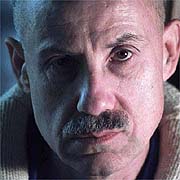
|
James Ellroy's Feast of DeathBy Walid Habboub
September 14, 2001
If you are not familiar with James Ellroy's work, you have probably saved yourself from being exposed to some of the toughest, darkest literature to ever be published in our time. You would also have missed out on some of the best literature of our time. And just as Ellroy's novels house a dichotomy of gruesome acts and terrible humanity, so does the author's life as presented in Vikram Jayanti's James Ellroy's Feast of Death. As Jayanti admitted after the showing at the Toronto International Film Festival, he came upon the project through financial desperation and sheer luck. What Jayanti has done, however, is take full advantage of this luck, and he has presented a very visceral, haunting and powerful documentary on an endlessly interesting man. Ellroy's story is one of great tragedy and brutal honesty. Growing up with a hard-nosed and not very likeable father, Ellroy lost his even less-liked mother at the age of ten, when she was raped and murdered on an LA roadway. Seeing as how her murder was never solved and her murderer never brought to justice, Ellroy projected his mother's death into the most infamous unsolved murder in American history, the Black Dahlia murder. As can be expected of any truly interesting person, Ellroy is much more than a man defined by one event. He is a man whose ideals have been shaped by this occasion, and who has grown up to become a man too smart for his own good. Combine this with an unrelenting, unapologetic attitude and you get a man with the charm of the Devil himself that the camera loves and that audiences are captivated by. Ellroy is a masterful storyteller and a fascinating personality. His brutal honesty is shocking and admirable, and his obsessions are enviable if only because they have given him a purpose in life. There is no doubt that the story here is Ellroy himself, and not his writing or his obsessions. Ellroy as a subject is so interesting that you really need nothing else in the movie. The film does not stray away from its central character, and uses the many different people that are a part of Ellroy's life as artists combining to make one larger-than-life mural. Their words masterfully relayed through a very fast-paced and frank narrative, Ellroy stands out as a tough, self-aware, no-bullshit man who has risen above but not forgotten the events that shaped his life, all the while displaying the curiosity, playfulness and wide-eyed wonderment of a ten-year-old child. Jayanti's methodical pace allows reflection, and his timely and effective use of some truly graphic pictures of murder victims strikes all the right notes at the right times. While some of the film begins to try too hard in conveying the feeling of a certain moment or creating a certain mood, it never loses focus for too long and always come back to where it is supposed to be. Laid out in a perfectly efficient 90 minutes, the film moves at a pace brisk enough to be an Ellroy novel while exploring many facets of a truly fascinating character. This is so effectively done that the memory of the film is a memory of Ellroy himself. Hopefully, this film will be shown on more and more screens across the country, though it seems unlikely, not because it is a bad film, but because it will have a very difficult time finding an audience. Nevertheless, the film is well-directed and presents a real dark side of the human psyche as only Ellroy can present it. At the core of it all is a man who happily lives with his ghosts and revels in their company. |
Thursday, October 31, 2024
© 2006 Box Office Prophets, a division of One Of Us, Inc.